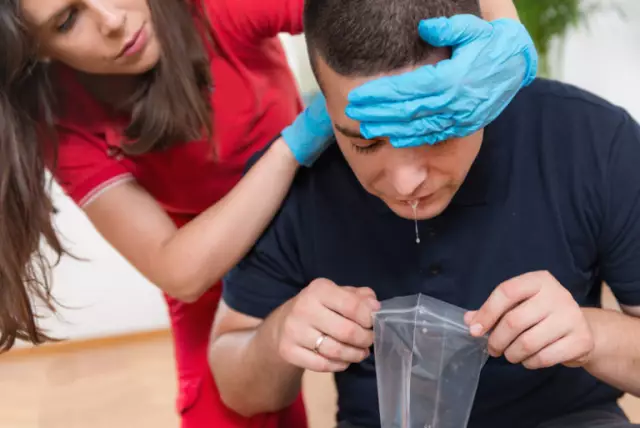- Author Rachel Wainwright wainwright@abchealthonline.com.
- Public 2023-12-15 07:39.
- Last modified 2025-11-02 20:14.
Solanine poisoning
Solanine is a toxic glycoalkaloid formed in plants of the nightshade family (tomatoes, eggplants, potatoes). In plants, it performs a protective function, possessing fungicidal and insecticidal properties.

Source: depositphotos.com
The solanine content in different parts of potatoes is not the same: in immature tubers up to 1%, in flowers 0.6-0.7%, sprouts up to 0.5%, tuber skin 0.03-0.06%, tops 0.25%, least of all in mature tubers - 0.002-0.007%. The amount of alkaloid also depends on the cultivar, weather conditions and geographic area of growth.
The content of toxin in potatoes increases significantly if the tubers are exposed to direct sunlight, freezing temperatures, affected by nematodes or have areas of decay.
Especially a lot of alkaloids accumulate in potato tubers in the spring, because preparation for the growing season begins in February. To prevent decay, in order to stimulate metabolic processes and germination of sprouts in tubers, the synthesis of solanine is activated. In spring, during storage, its level in tubers increases by 4-5 times and reaches 40-70 mg%. Most of all it accumulates in green areas, in the skin, around the eyes, and especially in the sprouts. The longer the sprouts of a potato, the more dangerous it is to eat it.
In eggplants, solanine is concentrated mainly in the peel, although its pulp contains at least 0.03%, which gives the fruit a characteristic bitter taste. The higher the solanine content of the eggplant, the more intense brown it takes on the cut.
The alkaloid is also found in unripe green tomatoes, where its concentration does not exceed 0.008%. As the fruit ripens and grows, the amount of solanine decreases significantly, almost not being determined by the time the tomato becomes fit for consumption.
How does solanine poisoning occur?
Solanine poisoning is possible when eating incorrectly or long-stored vegetables:
- green, sprouted or rotten potato tubers;
- green tomatoes;
- old, crumpled, long-stored eggplants.
Solanine accumulates especially quickly in the peripheral layer of potatoes 2 mm thick when the washed tubers are stored in transparent bags or nets.
Poisoning occurs when 200-400 mg of an alkaloid enters the body, which, in terms of the weight of the product, corresponds to 2-4 kg of unpeeled potatoes. The content of solanine in sprouted tubers is much higher - from 100 to 500 mg per 100 g of product (in a purified and unrefined form, respectively).
The amount of solanine is significantly reduced with proper cooking. When boiling potatoes in the skin, solanine is preserved, and when boiling peeled potatoes, most of it passes into a decoction. It is safe to eat tubers cooked in peel only until the end of autumn.
Sometimes poisoning occurs during self-medication at home with tinctures and decoctions cooked on potato sprouts or peels.
Poisoning symptoms
In large doses, solanine inhibits the central nervous system and causes hemolysis of erythrocytes, in small concentrations it leads to acute poisoning.
The symptoms of intoxication are nonspecific:
- general malaise, lethargy and drowsiness;
- loss of appetite;
- nausea, vomiting;
- bloating, cramping pain in the umbilical region;
- loose stools.

Source: depositphotos.com
The local irritating effect is manifested by sore throat, bitterness in the mouth, active salivation, ulceration of the oral mucosa is possible.
In severe poisoning, the symptoms of the neurotoxic action of solanine come to the fore:
- headache, dizziness;
- depression of consciousness or speech and motor arousal;
- unsteadiness of gait;
- disorientation;
- persistent pupil dilation;
- tonic and clonic seizures;
- hallucinations, delusions;
- sopor or coma.
In addition to signs of damage to the nervous system, the victims have shortness of breath, tachycardia, a decrease in blood pressure, and a decrease in urination.
First aid for solanine poisoning
- Carry out a gastric lavage, for which drink 1-1.5 liters of warm water or a weak solution of potassium permanganate, then induce an emetic urge by pressing on the root of the tongue.
- Take enterosorbent (Enterosgel, Polysorb, Polyphepan, Lactofiltrum).
- Take a saline laxative (magnesium sulfate) if diarrhea is absent.
- Provide an adequate drinking regimen to detoxify and prevent dehydration.
- With neuropsychic arousal, take a herbal sedative (tincture of valerian, motherwort, lily of the valley).
When is medical attention required?
Medical assistance is needed if:
- despite the provision of first aid, the victim's condition worsens or there is no positive trend;
- there is an admixture of blood in the vomit or feces;
- the victim is unconscious;
- convulsive syndrome developed;
- developed delirious syndrome;
- a child, elderly person or pregnant woman is injured.
There is no specific antidote. Treatment for severe solanine poisoning includes detoxification, maintenance of vital functions, primarily respiration and cardiac activity, and restoration of water-salt balance. Symptomatic therapy is carried out, aimed at eliminating dysfunction of the nervous system.
Possible consequences
Against the background of solanine poisoning, reactive inflammation of the pancreas, liver tissues, biliary tract, acute renal failure, acute gastritis, gastroenteritis, irritable bowel syndrome is possible.
Prevention
- Peel potatoes thoroughly before eating.
- Do not eat sprouted or green potatoes.
- Do not store potatoes in nets or clear plastic bags.
- Keep the stored potatoes away from direct sunlight.
- Do not eat unripe or overripe tomatoes and eggplants.
- Be aware of the toxicity of potato sprouts and their peels when treated with non-traditional methods.
YouTube video related to the article:

Olesya Smolnyakova Therapy, clinical pharmacology and pharmacotherapy About the author
Education: higher, 2004 (GOU VPO "Kursk State Medical University"), specialty "General Medicine", qualification "Doctor". 2008-2012 - Postgraduate student of the Department of Clinical Pharmacology, KSMU, Candidate of Medical Sciences (2013, specialty "Pharmacology, Clinical Pharmacology"). 2014-2015 - professional retraining, specialty "Management in education", FSBEI HPE "KSU".
The information is generalized and provided for informational purposes only. At the first sign of illness, see your doctor. Self-medication is hazardous to health!






